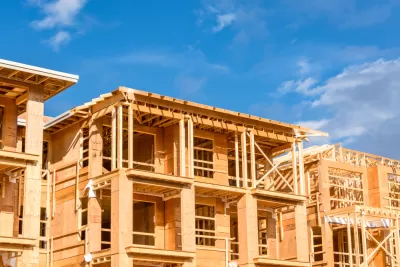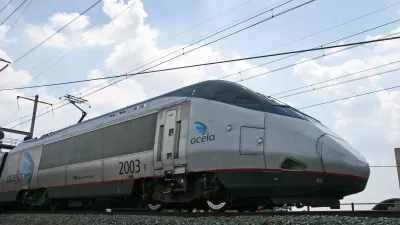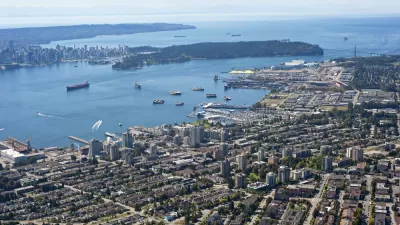The potential benefits of building tall buildings with wood are numerous.

Vancouver urbanists are calling for the city to make greater use of wood in high-rise buildings.
An article by Leyland Cecco chooses a prominent example to kick of an examination of the potential benefits of wood high rises:
Already, Vancouver’s 18-storey Brock Commons tower stands as a testament to the vast possibilities of wood. Once the world’s tallest timber building, it was built cheaper, faster and with less environmental impact than a comparable steel and concrete structure would have been – offsetting an estimated 2,432 metric tonnes of carbon.
Vancouver's province, British Columbia, has changed the provincial building codes to double the height limit for wood-frame buildings. Now the maximum height for a wood-framed building is 12 stories. The Canadian government could soon follow suite and set the same building height nationwide.
Vancouver isn't stopping at 12 stories, however. Cecco explains the next step in the evolution of wood-framed high rises:
Vancouver is now pushing even those limits by unveiling plans for the Canada Earth Tower, an ambitious 40-storey tower that would be the world’s tallest wooden building. The design includes around 200 homes, with an outdoor garden for every three floors as well as premium office space and retail.
The innovations occurring in Vancouver are also having a ripple effect around the world, according to the article.
FULL STORY: Canadian cities take wooden skyscrapers to new heights

Maui's Vacation Rental Debate Turns Ugly
Verbal attacks, misinformation campaigns and fistfights plague a high-stakes debate to convert thousands of vacation rentals into long-term housing.

Planetizen Federal Action Tracker
A weekly monitor of how Trump’s orders and actions are impacting planners and planning in America.

San Francisco Suspends Traffic Calming Amidst Record Deaths
Citing “a challenging fiscal landscape,” the city will cease the program on the heels of 42 traffic deaths, including 24 pedestrians.

Defunct Pittsburgh Power Plant to Become Residential Tower
A decommissioned steam heat plant will be redeveloped into almost 100 affordable housing units.

Trump Prompts Restructuring of Transportation Research Board in “Unprecedented Overreach”
The TRB has eliminated more than half of its committees including those focused on climate, equity, and cities.

Amtrak Rolls Out New Orleans to Alabama “Mardi Gras” Train
The new service will operate morning and evening departures between Mobile and New Orleans.
Urban Design for Planners 1: Software Tools
This six-course series explores essential urban design concepts using open source software and equips planners with the tools they need to participate fully in the urban design process.
Planning for Universal Design
Learn the tools for implementing Universal Design in planning regulations.
Heyer Gruel & Associates PA
JM Goldson LLC
Custer County Colorado
City of Camden Redevelopment Agency
City of Astoria
Transportation Research & Education Center (TREC) at Portland State University
Jefferson Parish Government
Camden Redevelopment Agency
City of Claremont





























